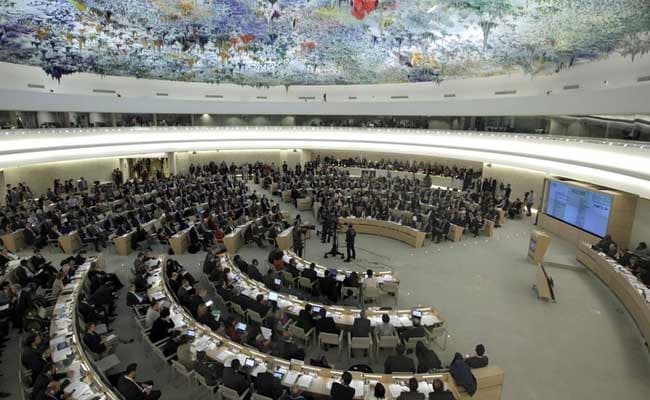
While India's election to the United Nations' Human Rights Council was celebrated by several countries, Nikki Haley, the outgoing US ambassador to the UN, criticised the "no competition" electoral process saying "yet again, countries with poor human rights records ran uncontested".
India's election to the United Nations' top human rights body for a period of three years reflects the country's standing in the international community, India's Permanent Representative to the UN Ambassador Syed Akbaruddin told PTI.
"Human Rights Council" was amongst the top trends in India. The icing on the cake was the fact that India got more votes compared to the 17 candidate countries which were also in the fray. In the 193-member UN General Assembly, only four countries did not vote for India. One country abstained.
The 18 new members were elected by absolute majority through a secret ballot. The countries needed a minimum of 97 votes to get elected to the council.
India's Ambassador to the UN, Syed Akbaruddin thanked India's "Friends in the UN for their support" adding, "It's a testament that the world holds India in high esteem. There were 18 candidates & we got the highest votes."
However, Ms Haley, who abruptly announced her exit as the UN Ambassador on Tuesday, said, "This lack of standards continues to undermine the organisation and demonstrates again why the United States was right to withdraw from it earlier this year. The United States will continue to support reforms that would make the Human Rights Council credible. More importantly, the United States will continue to be the world's human rights leader regardless of the suspect composition and poor decisions of the Human Rights Council."
While the last sentence may be challenged, what stands out is that Nikki Haley did not make any exception in criticising the newly elected states. India didn't get an exception, despite managing the most number of votes.
In contrast, the UN Human Rights Watch Director did make an exception for India, by not naming India, despite calling it a ridiculous vote.
In ridiculous vote devoid of competition, UN General Assembly elected #Philippines, #Eritrea, #Bahrain & #Cameroon to be among new members of @UN #HumanRights Council in 2019-2021. Such votes make mockery of word "election". Recall that in 2016, #Russia lost thanks to competition pic.twitter.com/YBEWr5AiQu
- louis charbonneau (@loucharbon) October 12, 2018
With the #MeToo movement finally hitting India, the allegations against India's Junior Foreign Minister MJ Akbar, who edited several newspapers and magazines before entering politics, saw a former Ambassador criticising India's election.
Former Ambassador KC Singh stated "Indian Gov can't jettison a minister with allegations against him by credible female journalists of sexual predatory. What rights will India defend if it can't stand up for #MeToo".
India gets elected to UN Human Rights Council as Indian Gov can't jettison a minister with allegations against him by credible female journalists of sexual predatory. What rights will India defend if it can't stand up for #MeToo at home?
- K. C. Singh (@ambkcsingh) October 12, 2018
India's election comes just a month after Michelle Bachelet, the newly appointed UN High Commissioner for Human Rights, said, "The people of Kashmir have exactly the same rights to justice and dignity as people all over the world and we urge authorities to respect them. The Office of the HRC continues to request permission to visit both sides of the LoC, and in the meantime, will continue its monitoring and reporting."
This after a 49-page report, the first-of-its-kind on Kashmir, saw the UN body controversially asking India to "respect the self-determination of the people of Kashmir". The former UN human rights body chief, Zeid Ra'ad Al Hussein, had called for an investigation into "all civilian killings since July 2016" and "the excessive use of force by security forces including serious injuries caused by the use of pellet guns immediately".
The report also said that India must stop using pellet guns for crowd control.
The Foreign Ministry hit back saying, "It is a selective compilation of largely unverified information. The report violates India's sovereignty and territorial integrity."
India's position on Kashmir, the Rohingya, Non Registered Citizens of Assam, or many other groups aside, this election places the country next to a group of bad boys.
Saudi Arabia is alleged to have killed and dismembered a journalist in their embassy in Turkey. Not to mention its role in making Yemen the world's worst humanitarian crisis.
Eritrea, Phillipines, Pakistan and Bangladesh are some of the other countries that human rights groups didn't want elected.
When NDTV and other journalists asked the spokesperson of the President of the UN General Assembly about the lack of credibility the "no competition" electoral process is seemingly reflecting, she said, "The President of the General Assembly is a facilitator, a convener, she is the President of a 193 member states, as you know it is not up to the President of the General Assembly to interfere in elections or decision. She is there to convene not to impose".
The good is news is that the UN resolution (60/251) that gave birth to the UN Human Rights Council on April 3, 2006, allows for what is known as a Universal Periodic Review. As per the resolution, all countries elected to the UN Human Rights Council will be reviewed under the universal periodic review mechanism during their term of membership.
The seemingly bad news is that a few of the elected members of the UN have arguably not upheld what is also stated in the same resolution -- the highest standards in the promotion and protection of human rights.
Track Latest News Live on NDTV.com and get news updates from India and around the world

